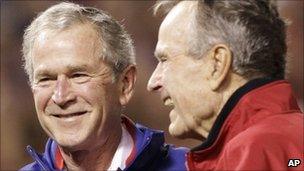George W Bush had 'sickening feeling' over WMD lack
- Published

In his autobiography, Mr Bush focuses on 14 major decisions of his life and presidency
Former US President George W Bush still has "a sickening feeling" about the failure to find weapons of mass destruction in Iraq, US media report.
The revelation comes in his memoir, "Decision Points", set to be published next week.
He also reveals that he temporarily considered replacing Vice President Dick Cheney, calling him the "Darth Vader of the administration".
But he has no comment on his successor in the White House, Barack Obama.
The 64-year-old former president defends his decision to invade Iraq in his autobiography, which was obtained in advance by the New York Times.
He argues that Iraqi citizens are better off without the former Iraqi leader Saddam Hussein, whom he calls a "homicidal dictator", adding the US is also better off without Mr Hussein pursuing biological or chemical weapons.
But Mr Bush admits that he was shocked when no weapons of mass destruction were found in Iraq.
"No one was more shocked and angry than I was when we didn't find the weapons," he writes.
"I had a sickening feeling every time I thought about it. I still do."
Replacing Dick Cheney
In his memoir, the former president also says he spent weeks investigating the possibility of replacing Mr Cheney with Tennessee Senator Bill Frist for his 2004 re-election campaign.
The idea was prompted in 2003 during a private lunch between Mr Bush and Mr Cheney, who offered to drop out of the race.
"I did consider the offer," Mr Bush writes in the memoir, according to the New York Times.
"He was seen as dark and heartless - the Darth Vader of the administration."
Mr Bush adds he was intrigued by the offer because he wanted to put an end to any notions that Mr Cheney was the real decision-maker in the White House. But the former president ultimately stuck with Mr Cheney because he had chosen him "to do the job" and "that was exactly what he had done".
Mr Bush also focuses on anecdotes and details of 14 major events of his life and presidency in his book, including the decision to stop drinking and his decisions following the attacks of 11 September 2001.
He admits he made mistakes when responding to Hurricane Katrina in 2005 and describes how he felt "like the captain of a sinking ship" when the economic crisis escalated towards the end of his presidency in 2008.
But he adds: "The financial crisis should not become an excuse to raise taxes."
The memoir could help Mr Bush, who left office with some of the lowest approval ratings of any US president, shed a more favourable light on his time in office.
"Whatever the verdict on my presidency, I'm comfortable with the fact that I won't be around to hear it," Mr Bush writes.
- Published2 June 2010